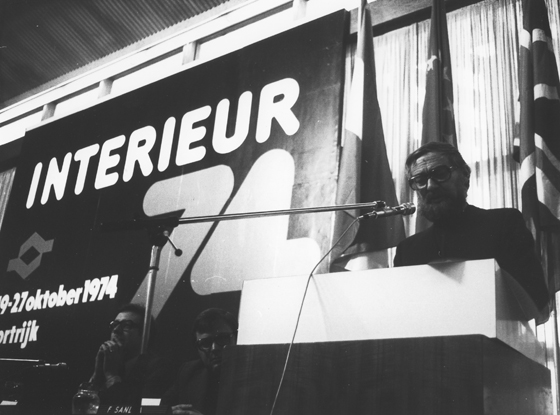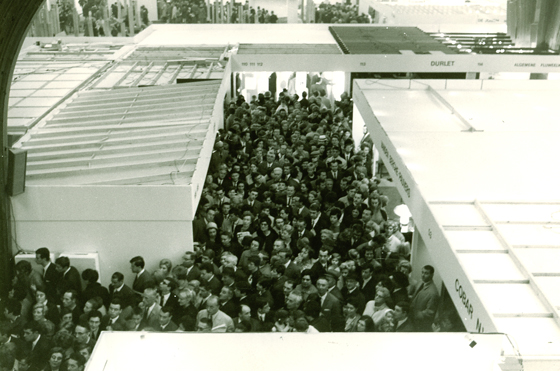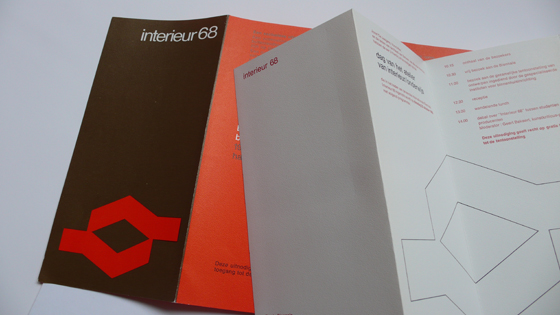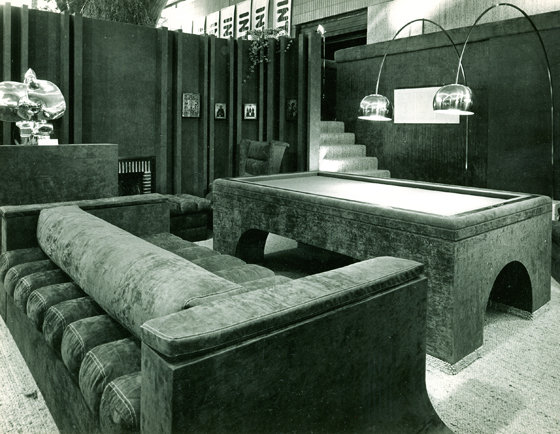Kortrijk Remembered: in conversation with Interieur co-founder Pol Descamps
Text von Simon Keane-Cowell
Zürich, Schweiz
22.07.11
Punching above its weight, the respected Belgian design biennale Interieur, held in the small town of Kortrijk since 1968, has always thought big. What it lacks in scale, it makes up for in discernment and ambition. 'We saw how international and influential Milan was and we wanted to be on that level,' explains one of its founders, Pol Descamps, while talking to Architonic about the fair's origins and significance.
Design legend Verner Panton speaks at Interieur in 1974
We live in an age of design blogs and countless other digital channels. It's perfectly possible (although far less sociable) to get a good overview of what's on show at any of the major international design fairs without packing that suitcase and downloading that city-guide app.
There are, nonetheless, a number of very good reasons to attend fairs. This is design we're talking about, after all, so how else are you to get a sense of a product's materiality without encountering it in the flesh, so to speak? Touching it, using it, getting to know it. And then there's the fact that these are trade events. There's business to be done. Relationships to cultivated. Hands to be shaken.
The visiting masses at the first edition of Interieur in 1968
What always strikes me, and also delights me, however, is the serendipitous aspect of design expos. The chance encounters with people who, otherwise, you'd never meet – and who you often never meet again. Everyone has a story to tell.
One such encounter took place at last October's edition of the highly respected Interieur design biennale in Kortrijk, Belgium. Here, I met Pol Deschamps, one of the founders of the show, which first opened its doors in 1968, and spent some time in his engaging company. He kindly agreed to do a short interview. Here it is.
…..
How did you become involved in the founding of the Interieur fair here in Kortrijk?
I'm an engineer and at that time I was managing director at Barco display systems and televisions. I'd previously studied at Harvard and had worked in Germany. So, I had international experience. At that time, there was a design centre in Brussels, while here in Kortrijk the chambers of commerce had a very international flavour.
When the town created these expo halls, which were inaugurated in 1966, I brought in the idea, together with the designer Freddy Sandra, of doing something in the halls, as they hadn't anything planned yet. So we organised a mini-conference with the design centre in Brussels, where we invited the design companies from West Flanders to show their products and to give a talk. It was 40 people one Saturday morning. That was how it started.
But you had your sights set quite high already?
Absolutely. We saw how international and influential Milan was and we wanted to be on that level, too. Although we started small. In 1968, when we organised the very first Interieur, we needed hostesses. So in stepped my wife, my sister and...well, a third one. (Laughs.) But our ambition was big.
How many exhibitors showed at the first Interieur?
About 50, but half of them were local. The roots were local, but the scope was international. We still have many interesting local companies showing here, like Modular. But the local character also informed the choice of the name – Interieur. Although English was the lingua franca, we felt 'Interieur' would reflect the French and Flemish people more than 'Interior'. I am the father of the name.
A stand at Interieur, 1972, with two Achille Castiglioni 'Arco' lamps in the background
How does coming back to the fair in 2010 compare to those early years?
Well, it has the same flavour, but it's very professionally organised, and it has brought great international recognition. The very clear selection process is something that's been there from the start, though, which means that it's not like any other trade fair. Freddy Sandra was very good for the principle of selection.
Would the fair have been as much of a success if it had been founded elsewhere in Belgium? Is there something about Kortrijk...
I think Kortrijk is a very interesting micro-climate. What happened in the 60s was a lot of industrialisation and internationalisation. All the big Belgian companies started making plans all over Europe. But not the ones from Kortrijk. We were the exception. We had full employment. A lot of indigenous entrepreneurship. We didn't need Brussels. And it's that 'can do' attitude that also made Interieur possible.
Interieur co-founder Pol Descamps: '[Interieur's] very clear selection process is something that's been there from the start, which means that it's not like any other trade fair.'
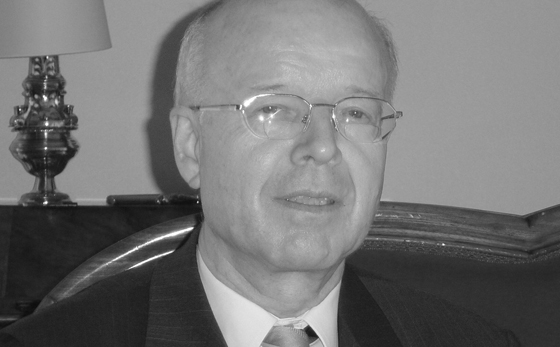
Interieur co-founder Pol Descamps: '[Interieur's] very clear selection process is something that's been there from the start, which means that it's not like any other trade fair.'
×1968, the year that Interieur was launched, was a highly turbulent time in social, political and cultural terms. How did this inform what you were doing, your project?
Oh, it all played a role. We were looking for new ways, but some people lost their anchors. We didn't. We kept our roots. We wanted to maintain a continuity, but at the same time be progressive. Embrace technology and a new way of looking at the world.
What do you think of Belgian design manufacturing now, compared to then?
Well, I look at it very technologically. I'm very pleased that a lot of people are looking at LED technology in lighting. We have some great design, but you can't do great design, and make it sustainable, unless you understand the basic technology. I am always pleased that companies like Delta Light and Modular are really active.
My big worry is that, in Europe, we don't have enough basic manufacturing. People say, 'You can have it made cheaper in China.' I reply 'Yes, but one day China will be too expensive, and then we'll have to look to Mars, maybe.' This is not the right way. Unfortunately, some of our companies here have looked to China. To really do good manufacturing here, of course, you have to be a lot more specialised and have real break-throughs. That's the challenge.
Pol, thank you very much.
....
